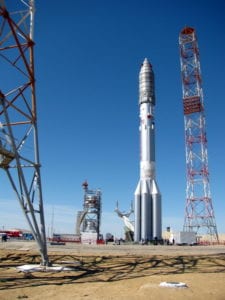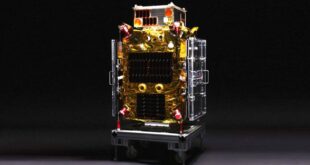
Three Proton-M launch vehicles have been returned from the Baikonur Cosmodrome in Kazakhstan to their manufacturer in Moscow after newly introduced Roscosmos quality control measures found defective components and parts in them.
The three launch vehicles were found to have defective components and parts that were believed to have been manufactured between 2015 and 2016. The Proton-M launch vehicles have been shipped back to their manufacturer, Khrunichev, located near Moscow so that the defective components can be replaced.
According to Russian news media, the more stringent quality control measures instituted by Roscosmos for both state and commercial space sectors discovered the defective components on the Proton-M launch vehicles in March 2020.
“Having analyzed the situation, experts came to the conclusion that the replacement of the [faulty] components on the three Proton-M rockets located at Baikonur could only be done at the factory,” an anonymous source told the Sputnik online media platform.
It has been reported that two of the three Proton-M launch vehicles have already been transported by train to the Khrunichev plant near Moscow from the Baikonur Cosmodrome, while the remaining rocket awaits transportation.
It is believed that the required overhaul of all three Proton-M launch vehicles will be completed in time for July 2020 when it is expected that the first of several delayed launches will take place.
In March 2020 it was announced that the launches of the Express-80 and Express-103 communications satellites that were to use Proton-M launch vehicles would be indefinitely delayed. It now turns out that these delays were due to the discovery of the defective components and parts on the launch vehicles.
This then led Russian engineers to check the Proton-M launch vehicle that was slated to launch the Roscosmos-European Space Agency (ESA) ExoMars mission, and that too was found to have defective components and parts. This discovery is, in part, why the ExoMars mission – now scheduled for launch in 2022 – has also been delayed.
The Proton-M is considered to be one of Russia’s ‘workhorse’ launch vehicles with a launch success rate of 90 per-cent from its 109 launches so far.
The Russian space programme has been troubled with poor quality control in its manufacturing base for some time now and this is thought to be the result of a combination of chronic underinvestment, low wages for factory workers, and endemic corruption.
 SpaceWatch.Global An independent perspective on space
SpaceWatch.Global An independent perspective on space




